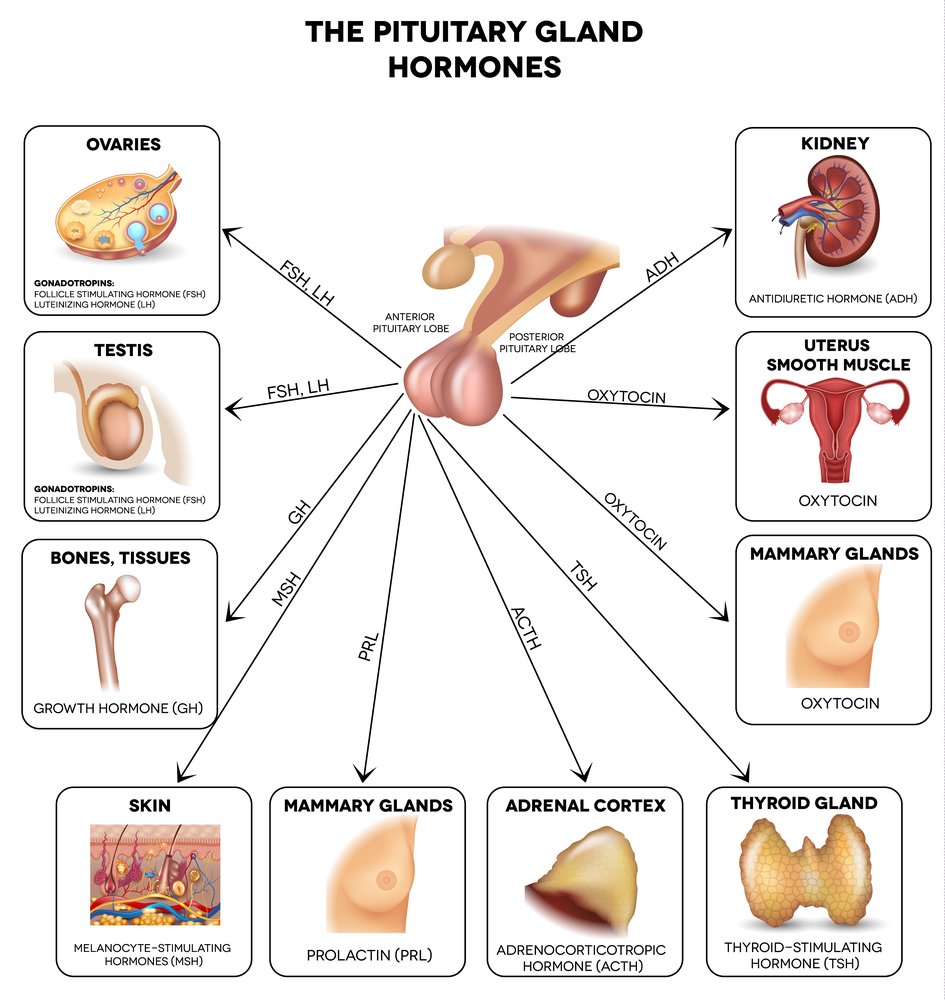What's On This Page?
ToggleDo you feel tired and drained of energy all the time? Do you struggle to get up in the morning, no matter how early you went to bed? Maybe you’ve been trying to correct your thyroid hormone without luck. That could be because your adrenal glands aren’t functioning effectively.
Fatigue has many causes, and it could be related to your adrenal glands. Adrenal glands produce ACTH (adrenocorticotropic hormone) which converts to cortisol hormone. Your adrenal glands also make aldosterone which has to do with blood pressure and salt/water balance.
If you’re adrenals are weak, you’ll have thyroid disease, as in hypothyroidism. This is because the two endocrine glands work synergistically to supply essential hormones to every cell throughout the body. Because most of the symptoms of hypothyroidism are similar to adrenal fatigue, the two conditions can be confused wtih one another. If you’d like to learn more about that, I’ve written another article called, The Link Between Chronic Fatigue and Your Thyroid, which you can read by CLICKING HERE.
Take a look at the graphic I’ve posted here to see the other endocrine glands in your body and what hormones they produce. Just as an FYI, oxytocin is what helps a woman ‘push’ out the baby, it’s also our amorous hormone! Another hormone called Follicle-stimulating hormone (FSH) is an extremely important hormone for both men and women’s reproductive pathways.
Uncontrolled thyroid disease as well as ovarian cysts and heavy or unusual vaginal bleeding could be tied to FSH. This hormone is often high in people with hypothyroidism and my point is that our endocrine hormones are tied together. Think of a spider web, you can’t pull one end of the hormone web, without impacting all the other hormones in the web.
The Human Endocrine System

Today, life is hectic. Think about the past year or two. Have you been under pressure or a lot of stress. If work, school or relationships are causing you to suffer with constant deadlines, pressure or anguish (even mental anguish) then it’s possible that your exhaustion is from adrenal fatigue. You might be wondering, what is that exactly.
Adrenal fatigue is not a real diagnosis, only holistic doctors consider it as an underyling cause of chronic fatigue. But it is real in the sense that it happens, the adrenal glands wear out, and “adrenal fatigue” is the term most people use. Another term, perhaps more medical in nature is “adrenal insufficiency” or “cortisol insufficiency” or “Addison’s disease.”
Whatever you want to call it, adrenal fatigue is the type of fatigue that occurs when your “fight or flight glands” produce too much cortisol and aldosterone (think of the alarming stage), and then after a while, too little cortisol because they’ve petered out. This can happen from too much physical or emotional stress. The antidote to adrenal fatigue is easier said than done, although a mental or physical vacation from the stress might help. It certainly can’t hurt. Some people under stress eventually lose interest in sex altogether.
The reason for low libido is the pregnenolone steal. Pregnenolone is a hormone in your body. It normally produces your sex hormones like DHEA, estrogen and testosterone. But under chronic stress, production of these sex hormones declines because your stress hormone cortisol is on overdrive.
So the cortisol that is produced -when you’re exasperated, stressed, working late or angry- is stealing the pregnenolone, and therefore production of sex hormones goes down. The more cortisol you crank out, the less interested you become in your partner. If adrenals are a problem, one herbal remedy is ashwagandha. This herb helps with adrenals and thyroid and it’s the star ingredient in my custom formula called Thyroid Script.* Youcan learn more about that and read reviews by clicking on this image below.
Dehydration is a contributing factor to adrenal fatigue.
Maybe you pour salt on everything? Do you crave salty foods like potato chips? It’s possible that this is due to adrenal fatigue and the resulting alterations in aldosterone hormone which results in ‘dehydration.’ If your lips feel dry, you’re already dehydrated adn that’s your sign to drink more. You can add marshmallow root to your water and infuse it. To see how, watch my VIDEO.
Your body can’t utilize fluid effectively, or properly regulate sodium and potassium levels which causes mild dehydration, even though you could be drinking plenty of water. The shifts in sodium, and the fluid changes result in low blood pressure, and some electrolyte imbalances which then triggers salt cravings.
This is very common for people who have chronic fatigue, or who have been seriously ill for a long time.
Here’s a quick drink recipe that works very well if you’re dehydrated:
Mix about one half teaspoon of sea salt and a squeeze of oranges (it adds vitamin C) into a big water bottle (not a glass, that’s too small). Optionally, you can add a scoop of my Yummy Greens and the water will then turn green, but it will still taste delicious (kind of sweet). Drink it over a few hours and it will give you more energy than plain water.
This salt water ‘greens’ drink will be an excellent pick-me-up but don’t drink too much, because it will raise blood pressure. Either way, the signal of adrenal fatigue is at play is a craving for salty foods and low blood pressure.
How do you know for sure if adrenal fatigue is what you’re dealing with?
There are four easy tests you can do at home to see if you have adrenal fatigue. I suggest you try these, and then have a complete hormone panel done by an endocrinologist to confirm your suspicions. Real tests are far more reliable than the tests I’m listing below. If your adrenals are tanked, start a protocol of healing with adrenal-healing foods, herbs, vitamins and minerals, lifestyle changes, and a healing sleep protocol. In fact, here’s an article I wrote about licorice root, which can be purchased at any health food store online, you can CLICK HERE to read, Licorice Helps Chronic Fatigue and Heartburn.
Tests to Check for Adrenal Fatigue
1. The Pupil Test
Go into a dark room and shine a little flashlight towards your eyes. Your pupils respond to light and dark, and upon the light shining into your eyes, they should constrict (get smaller) immediately. The constriction happens within seconds if you’re healthy, but if your pupils stay dilated for 10 to 20 seconds before constricting, or they never constrict, then you probably have adrenal fatigue.
2. Thermoregulation
Adrenal fatigue will absolutely compromise the feedback loop that controls your body’s temperature. You might feel cold, then feel suddenly hot. Your temperature may vary by 2 degrees from day to day. If you take your temperature three times in one day, and three more times the next day, then take the average of each day, it should not differ by more than a couple of degrees from day to day. If it does, your adrenals are taxed, and thermoregulation is more difficult to achieve. This might explain the hot/cold situation.
3. The Scratch Test
It’s technically termed Sergents White Line test. If you’re adrenals are functioning well, you should be able to “bounce back” from this pretty quickly. You ‘draw’ a line on your belly with the back of a pen or something that can’t hurt you. The white line should go away pretty quickly, within seconds. If it doesn’t white line doesn’t disappear immediately or it gets bigger then you have adrenal fatigue. By the way, the white line is made by pressure, not ink, or fingernails. This test is not entirely reliable in my opinion, but it’s fun to try it and if it occurs, consider it one more piece of a bigger puzzle.
4. Blood Pressure Response
You’ll be taking your blood pressure twice for this test. Make sure you’ve drank enough water the day you test. Lie down in bed and rest for 5 minutes then take your blood pressure. Then get up and take your blood pressure immediately (while standing up). The top number (systolic) should go up by about 8 to 10 points. I’m posting a graphic here for you because blood pressure varies throughout a person’s life. It also changes from standing to sitting, from hour to hour, during times of stress versus calm and it even changes minute to minute.


Suzy Cohen, has been a licensed pharmacist for over 30 years and believes the best approach to chronic illness is a combination of natural medicine and conventional. She founded her own dietary supplement company specializing in custom-formulas, some of which have patents. With a special focus on functional medicine, thyroid health and drug nutrient depletion, Suzy is the author of several related books including Thyroid Healthy, Drug Muggers, Diabetes Without Drugs, and a nationally syndicated column.


